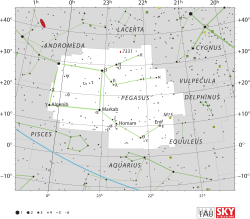離宮四
外觀
離宮四在飛馬座的位置 | |
| 觀測資料 曆元 J2000.0 | |
|---|---|
| 星座 | 飛馬座 |
| 星官 | 室宿 離宮 |
| 赤經 | 22h 43m 00.13743s[1] |
| 赤緯 | +30° 13′ 16.4822″[1] |
| 視星等(V) | +2.95[2] |
| 特性 | |
| 光譜分類 | G2 II + F0 V[3] |
| U−B 色指數 | +0.57[2] |
| B−V 色指數 | +0.86[2] |
| 天體測定 | |
| 徑向速度 (Rv) | +4.3[4] km/s |
| 自行 (μ) | 赤經:–100.06[1] mas/yr 赤緯:+15.46[1] mas/yr |
| 視差 (π) | 19.51 ± 0.18[1] mas |
| 距離 | 167 ± 2 ly (51.3 ± 0.5 pc) |
| 絕對星等 (MV) | –1.18[5] |
| 軌道[6] | |
| 繞行週期 (P) | 813 天 |
| 偏心率 (e) | 0.183 |
| 近心點 曆元 (T) | 2452025 HJD |
| 近心點幅角 (ω) (secondary) | 344.7° |
| 半振幅 (K1) (primary) | 14.37 km/s |
| 詳細資料 | |
| η Peg A | |
| 質量 | 3.82 ± 0.52[7] M☉ |
| 半徑 | 18[8] R☉ |
| 表面重力 (log g) | 2.40[9] |
| 亮度 | 247[7] L☉ |
| 溫度 | 5,450[7] K |
| 金屬量 [Fe/H] | +0.39[9] dex |
| 自轉 | 818[5] |
| 自轉速度 (v sin i) | 1.4[6] km/s |
| 其他命名 | |
離宮四,即飛馬座η(η Peg,η Pegasi)是一個位於飛馬座的雙星系統,距離地球約167光年。
特徵
[編輯]離宮四的視星等為+2.95,[2] 是飛馬座第五亮的恆星。根據視差測量,它距離地球約167光年(51秒差距)。[1]
離宮四由一對聯星組成,兩顆恆星相互旋轉的周期為813天,軌道離心率為0.183。[6] 其中較亮的主星是一顆亮巨星,恆星光譜為G2 II,[3] 質量是太陽質量的4倍。[5] 通過干涉測量並矯正周邊昏暗後測量出這顆恆星的角直徑為3.26 ± 0.07角分,[11] 這意味着在距離地球167光年的實際位置上,它的半徑約為太陽半徑的18倍。[8] 它的亮度是太陽亮度的247倍,[7] 表面溫度為5,450K。[7] 這顆恆星的自轉比較慢,視向自轉速度為1.7 km·s–1,自轉周期約為818天。[5] 離宮四的伴星是一顆F-型主序星,恆星光譜為F0 V.[3]。在天球投影上,這對聯星附近還有兩顆G型恆星,目前尚不知道是否和這對聯星有物理聯繫。
離宮四和危宿一(寶瓶座α)、虛宿一(寶瓶座β)三顆中等質量的恆星組成一個恆星群落,它們在星際運動的方向垂直於銀河面。[12]
命名
[編輯]離宮四在西方的傳統名字為Matar,來自於阿拉伯語Al Saʽd al Maṭar(سعد المطر),意思為「幸運雨之星」。在中國古代星官系統中,離宮四屬於北方玄武七宿中室宿離宮(表示皇帝的行宮)第四星,這也是離宮四名字的來由。[13]
大眾文化
[編輯]美國海軍有一艘貨船「USS Matar (AK-119)」是以離宮四的英文名Maṭar命名。
參考資料
[編輯]- ^ 1.0 1.1 1.2 1.3 1.4 1.5 van Leeuwen, F. Validation of the new Hipparcos reduction. Astronomy and Astrophysics. November 2007, 474 (2): 653–664. Bibcode:2007A&A...474..653V. doi:10.1051/0004-6361:20078357.
- ^ 2.0 2.1 2.2 2.3 Johnson, H. L.; et al. UBVRIJKL photometry of the bright stars. Communications of the Lunar and Planetary Laboratory. 1966, 4 (99). Bibcode:1966CoLPL...4...99J.
- ^ 3.0 3.1 3.2 Parsons, Sidney B.; Ake, Thomas B., Ultraviolet and Optical Studies of Binaries with Luminous Cool Primaries and Hot Companions. V. The Entire IUE Sample, The Astrophysical Journal Supplement Series, November 1998, 119 (1): 83–104, Bibcode:1998ApJS..119...83P, doi:10.1086/313152
- ^ Wilson, Ralph Elmer. General Catalogue of Stellar Radial Velocities. Washington: Carnegie Institution of Washington. 1953. Bibcode:1953QB901.W495......
- ^ 5.0 5.1 5.2 5.3 Pizzolato, N.; Maggio, A.; Sciortino, S., Evolution of X-ray activity of 1-3 Msun late-type stars in early post-main-sequence phases, Astronomy and Astrophysics, September 2000, 361: 614–628, Bibcode:2000A&A...361..614P
- ^ 6.0 6.1 6.2 Massarotti, Alessandro; et al, Rotational and Radial Velocities for a Sample of 761 HIPPARCOS Giants and the Role of Binarity, The Astronomical Journal, January 2008, 135 (1): 209–231, Bibcode:2008AJ....135..209M, doi:10.1088/0004-6256/135/1/209
- ^ 7.0 7.1 7.2 7.3 7.4 Hohle, M. M.; Neuhäuser, R.; Schutz, B. F., Masses and luminosities of O- and B-type stars and red supergiants, Astronomische Nachrichten, April 2010, 331 (4): 349, Bibcode:2010AN....331..349H, doi:10.1002/asna.200911355
- ^ 8.0 8.1 Lang, Kenneth R., Astrophysical formulae, Astronomy and astrophysics library 1 3, Birkhäuser, 2006, ISBN 3540296921. The radius (R*) is given by:
- ^ 9.0 9.1 Luck, R. Earle; Wepfer, Gordon G., Chemical Abundances for F and G Luminosity Class II Stars, Astronomical Journal, November 1995, 110: 2425, Bibcode:1995AJ....110.2425L, doi:10.1086/117702
- ^ MATAR -- Star in double system, SIMBAD Astronomical Object Database (Centre de Données astronomiques de Strasbourg), [2012-03-03], (原始內容存檔於2020-01-11)
- ^ Richichi, A.; Percheron, I.; Khristoforova, M., CHARM2: An updated Catalog of High Angular Resolution Measurements, Astronomy and Astrophysics, February 2005, 431: 773–777, Bibcode:2005A&A...431..773R, doi:10.1051/0004-6361:20042039
- ^ Ayres, Thomas R.; Brown, Alexander; Harper, Graham M. Chandra Observations of Coronal Emission from the Early G Supergiants α and β Aquarii. The Astrophysical Journal. July 2005, 627 (1): L53–L56. Bibcode:2005ApJ...627L..53A. doi:10.1086/431977.
- ^ 香港太空館 - 研究資源 - 亮星中英對照表 網際網路檔案館的存檔,存檔日期2010-08-18.


